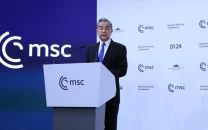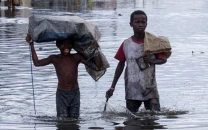Quebec forum seeks French word for 'hashtag'
A French-language alternative to words like "tweet" and "hashtag" remains woefully absent.

Certain countries have attempted to "frenchify" different terms cooked up in faraway Silicon Valley and on Wall Street, but a French-language alternative to words like "tweet" and "hashtag" remains woefully absent.
"A common lexicon for economic and business circles still doesn't exist," said Louise Marchand, president of the Quebec Board of the French Language (OQLF) who published an online dictionary of terminology, including translations of contemporary terms used in finance, accounting and new technology -- English words that sneakily pop up in French-language discourse.
"That's part of the genius of the English language: Being able to create words rapidly and efficiently, and to be sure they are used. To create words in French, we must work very quickly. Because once a word from English is implanted (in everyday speech), it's difficult to dislodge," she said.
It is often difficult for words created and embedded in Quebecois French to cross the Atlantic and take root in European and African French-language vocabularies -- or vice versa. For example, outside Quebec, no one uses the word "pourriel" to mean "spam," "baladodiffusion" for "podcast" and "clavardage" for "chat."
French is the third most commonly used language on the Web and social media networks as well as in international trade, according to studies cited at the forum in Quebec, which lasts until Friday.
Still, "there exists a real need to implement a digital Francophone Web strategy. One of the first steps in this strategy lies in the 'Frenchification' of digital terminology," said Claude Malaison, a specialist in digital communications and business.
By 2050, Africa will account for 80 percent of some 700 million French-speakers, according to projections by the International Organization of La Francophonie (OIF), a union of French-speaking nations.
"The future of the French-speaking world and the French languages is playing out in Africa," said Milad Doueihi, professor at Quebec's Laval University.
In the 1990s, the OIF launched the Francophone Information Highway Fund to promote the creation of Web sites in French-speaking Africa.
But today, "the most important thing is access" to infrastructure (telephone connection, bandwidth, Wi-Fi etc.) to facilitate consultation, creation and dissemination of cultural production in French, said Doueihi, who called for the digitalization of French without waiting for US giant Google.
Officials from the OIF in Quebec have already indicated that the fund was being reevaluated and a new digital strategy may be on the agenda at the OIF's October summit in Kinshasa.
Better Internet access and the launch of an interactive French-language Web could stimulate exchanges between French enterprises and the development of business in the North and South of the French-speaking world, participants at the Quebec forum argued.
"It's as though we were the only people in the world to question whether our language is a fundamental asset of our economy," said Lionel Zinsou, an influential Franco-Beninian banker.



















COMMENTS
Comments are moderated and generally will be posted if they are on-topic and not abusive.
For more information, please see our Comments FAQ